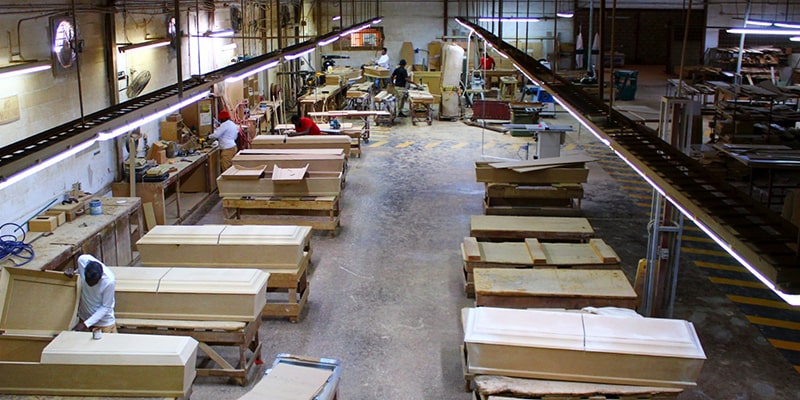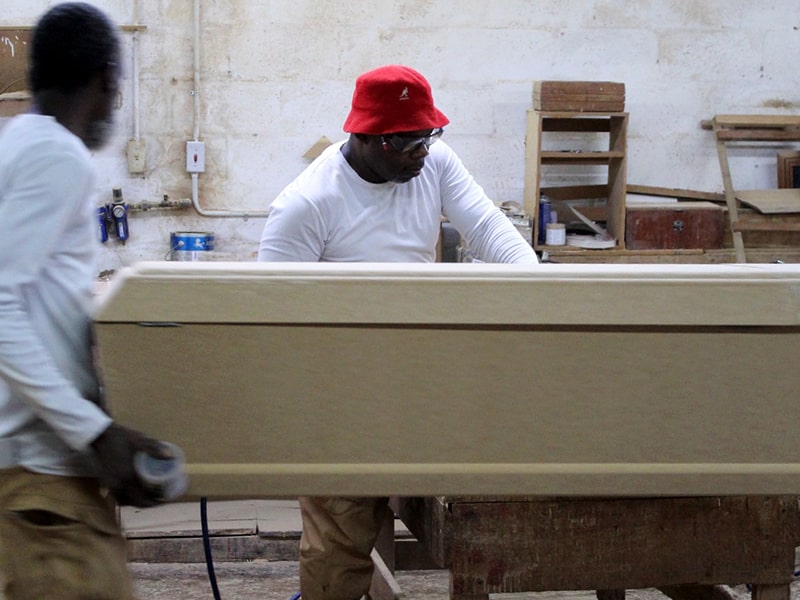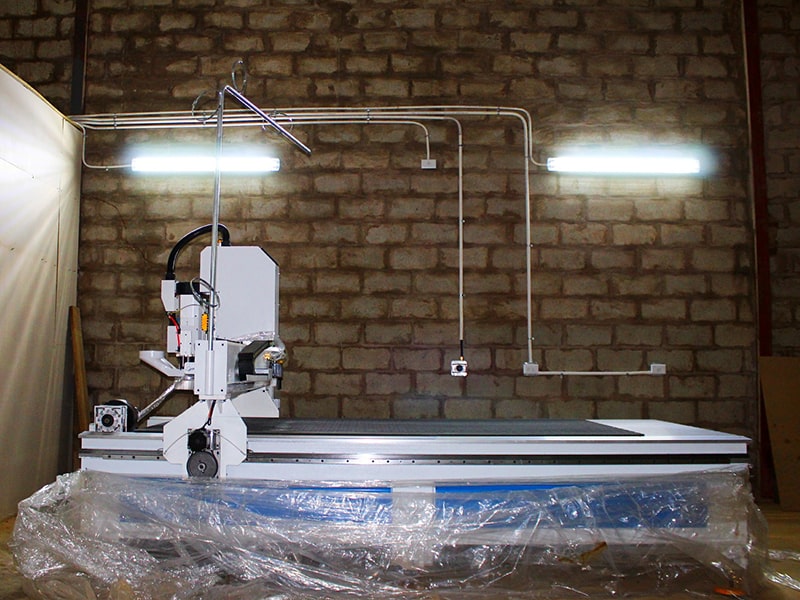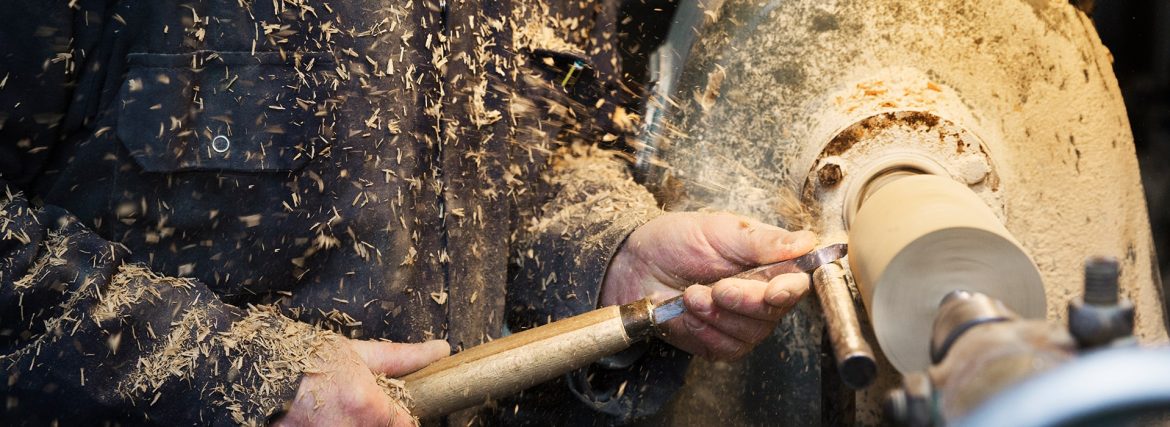A heritage of Woodworking Expertise
Crafting Tradition and Innovation in Trinidad & Tobago
In the heart of Trinidad & Tobago’s manufacturing sector, TT Woodworking Specialists (TTWS) has quietly built a reputation as one of the region’s most skilled woodworking companies. Founded in 1977 by Orlando Allen’s father, Patrick Allen and his business partner, Harry Jordan, the company’s original mission was to supply coffins and caskets exclusively for their funeral homes. Demand quickly grew, prompting TTWS to open its doors to other funeral service providers.
What began as a small, family-oriented venture has since matured into a diversified manufacturing business, balancing traditional craftsmanship with cutting-edge automation. Today, TTWS produces not only high-quality coffins and caskets but also doors, moldings, cabinetry, and siding for residential and commercial projects.
“Our craftsmanship is our signature. We’ve built a reputation for quality, precision, and trust—and we continue to evolve,” Orlando Allen, Managing Director, says.
Expanding the Vision
While coffins and caskets remain the company’s core competency, TTWS has used its deep woodworking expertise to expand into construction and design markets. With architects, contractors, and homeowners seeking locally manufactured, customizable wood products, TTWS identified a growing opportunity in cabinetry and interior finishes.
This diversification not only broadens revenue streams but also strengthens the company’s resilience amid market fluctuations. As Allen explains, “We’ve invested heavily in residential housing projects—both locally and regionally—because that’s where the demand is strongest. Our goal is to provide high-quality cabinetry and doors at truly affordable prices.”
Milestones and Manufacturing Evolution
Since its founding, TTWS has stayed true to its craft while steadily modernizing. Over the past five years, the company has undergone a major technological transformation, introducing new machinery and semi-automated production processes.
“We’re still not fully automated,” Allen admits, “but we’ve made tremendous strides. In the last five years, we’ve added over a dozen machines, including computerized systems that deliver higher speed, precision, and cost efficiency.”
The shift has also required a new level of technical expertise among staff. TTWS has responded by recruiting more skilled technicians and offering in-house training to upskill its workforce.

“Many of our senior staff retired just as automation became essential,” says Allen. “That gave us the chance to bring in a new generation of workers who could adapt to the digital tools shaping modern manufacturing.”
The result: a more efficient operation with improved quality control and faster turnaround times.
“Automation has made us faster, more precise, and more efficient—but it’s our people who make it all possible,” Allen determines.
The Challenge of Foreign Exchange and Supply Chain Realities
Even as operations become more advanced, TTWS continues to navigate external challenges that shape Trinidad & Tobago’s manufacturing landscape. Chief among these are foreign exchange limitations and supply chain dependencies.
While supply chains have largely normalized since the disruptions of COVID-19, acquiring foreign currency to import key inputs remains a persistent hurdle. “We rely on suppliers in the U.S., Canada, and China for much of our material,” Allen explains. “The challenge isn’t getting the goods—it’s paying for them. Access to foreign exchange is limited, and when it’s available through the ExIm Bank, it comes at a steep premium.”

Some manufacturers resort to informal markets, but TTWS avoids that route whenever possible. “It’s not sustainable,” Allen says. “We prefer to operate above board, even if it means tighter margins.”
Despite these pressures, TTWS has maintained stability through careful inventory management and local supplier relationships. The company works closely with House of Marketing, Carpenter’s Edge, and lumber suppliers such as Bobby’s Sawmill, sourcing medium-density fiberboard (MDF), PVC boards, and hardwoods. “We dry and test our lumber in-house to maintain consistent quality,” Allen adds.
“By managing our own kiln-drying process, we can buffer price fluctuations and ensure dependable supply.”
Balancing Price and Quality
In a market as price-sensitive as Trinidad & Tobago, value is everything. Funeral homes and families are increasingly seeking affordable options, especially as burial patterns shift toward cremation due to limited cemetery space. The government’s funeral grant—roughly TT$7,000 (USD $1,000)—has further shaped consumer expectations.
“We’ve seen a shift toward simpler, more economical coffin designs domestically,” Allen says. “However, our regional clients prefer more upscale, stylized pieces. We’re constantly adapting to serve both.”
To meet these diverse demands, TTWS has introduced new designs featuring composite materials, quartz, and granite accents, blending craftsmanship with modern aesthetics. These innovative products have found strong interest in regional export markets, where demand for customized, high-end caskets continues to rise.
“We’re combining traditional craftsmanship with new materials—lumber, quartz, granite—to create a truly unique, premium design,” Allen relays.
Partnering with Local Expertise
TTWS’s ability to deliver consistent quality also relies on its local supplier network, a vital component of its operational strategy. Partners such as House of Marketing and Carpenter’s Edge supply specialized boards and materials used in cabinetry and doors, while Bobby’s Sawmill provides much of the raw lumber.
PVC doors—one of TTWS’s newest product lines—have quickly become popular for their rich appearance, affordability, and durability. “PVC doors are the future for many households,” Allen notes. “They look luxurious but are cost-effective and low-maintenance.”
By working closely with these domestic partners, TTWS reduces lead times, supports local industry, and keeps money circulating within the national economy.
Eyes on the Horizon: Regional and International Expansion
With its foundation strong and production more efficient than ever, TT Woodworking Specialists is now turning outward. The company has already expanded sales into several Caribbean islands and is now exploring opportunities on the African continent. “We’re currently in negotiations with a company in Ghana,” Allen reveals. “Our goal is to establish a presence in West Africa, beginning with Ghana, Senegal, and the Ivory Coast.”
This strategic move reflects both ambition and pragmatism. African markets present natural opportunities for companies like TTWS, where craftsmanship, affordability, and cultural connection intersect. Allen sees the expansion as the next major chapter in the company’s legacy.
With automation advancing, regional exports growing, and new markets emerging, TTWS is well-positioned to continue shaping the woodworking landscape across the Caribbean—and beyond.
“The Caribbean will always be our home base, but Africa represents the future. There’s tremendous opportunity to grow and share what we do best,” Allen concludes.

AT A GLANCE
Who: Trinidad & Tobago Woodworking Specialists
What: A Leading and diversified woodworking manufacturer serving residential, commercial, and regional markets
Where: Trinidad & Tobago, Caribbean region
Website: www.ttws.co.tt
PREFERRED VENDORS/PARTNERS
Hunte WIlliams Inc Ltd. : www.huntewill.com & nhunte@huntewill.com
Hunte Williams is a boutique consultancy firm dedicated to the provision of total solutions and support to employers in all aspects of Employment/Industrial Relations in the Trinidad and Tobago and the wider Caribbean.





 This information will never be shared to third parties
This information will never be shared to third parties